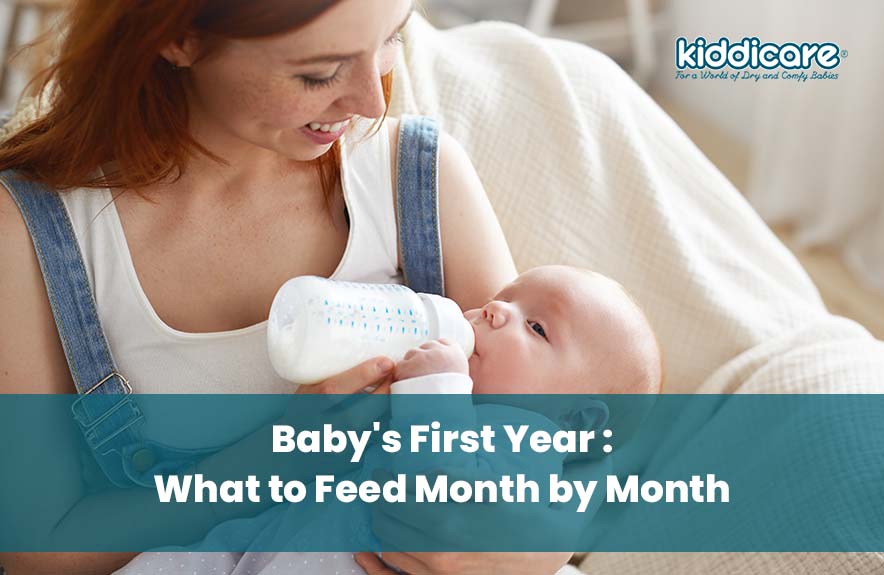The journey through your baby's first year is a whirlwind of firsts: first smiles, first giggles, first steps, and of course, first foods! As a parent, one of the most exciting yet often daunting aspects is figuring out what to feed your little one and when. This comprehensive guide will walk you through your baby's first year, month by month, providing insights into their nutritional needs, developmental milestones related to feeding, and delicious, healthy food ideas.
The Foundation: First Six Months (Exclusively Breastmilk or Formula)
Before we dive into solids, it's crucial to understand the importance of breastmilk or formula during the initial months. For the first six months of life, the American Academy of Pediatrics (AAP) recommends exclusive breastfeeding. If breastfeeding isn't possible, a high-quality infant formula is the next best option.
Why is this so important?
- Complete Nutrition: Breastmilk and formula are perfectly designed to provide all the nutrients your baby needs, proteins, fats, carbohydrates, vitamins, and minerals in the right proportions for their rapid growth and development.
- Immune Support: Breastmilk, in particular, contains antibodies that help protect your baby from infections and illnesses.
- Digestive System Development: Your baby's digestive system is still maturing during these early months. Introducing solids too early can put undue stress on their tiny tummies and potentially lead to allergies or sensitivities.
Key Milestones (0-6 Months):
- Rooting and Sucking Reflex: Present from birth, these reflexes are essential for feeding.
- Tongue-Thrust Reflex: This reflex enables babies to push foreign objects out of their mouths, thereby protecting them from choking. It diminishes around 4-6 months, signaling readiness for solids.
- Head Control: By 4-6 months, babies typically develop reasonable head control, enabling them to sit with support, which is essential for safe eating.
What to "Feed":
Focus solely on breastmilk or formula on demand. This means feeding your baby whenever they show signs of hunger, such as rooting, sucking on their hands, or fussing.
Ready for Solids: Around 6 Months
The "magic" age of six months is often cited as the ideal time to introduce solid foods. However, it's more about developmental readiness than a strict calendar date. Look for these signs that your baby is ready:
- Good Head and Neck Control: They can hold their head steady and upright.
- Sits Up with Support: They can sit in a high chair or on your lap with minimal assistance.
- Loss of Tongue-Thrust Reflex: They are no longer able to push food out of their mouth automatically.
- Shows Interest in Food: They watch you eat, reach for your food, and open their mouth when food is offered.
- Weight Gain: Typically, they've doubled their birth weight.
First Foods:
When starting solids, remember that it's about introducing new tastes and textures, not replacing breastmilk or formula. Breastmilk/formula remains the primary source of nutrition.
- Iron-Fortified Infant Cereal: This is often recommended as a first food due to its iron content, which becomes increasingly important around 6 months as your baby's iron stores begin to deplete. Mix with breast milk, formula, or water to achieve a fragile consistency.
- Pureed Single-Ingredient Vegetables: Start with mild, easily digestible vegetables like sweet potato, butternut squash, green beans, or peas.
- Pureed Single-Ingredient Fruits: Applesauce, bananas, pears, and avocados are good choices.
How to Introduce:
- One New Food at a Time: Introduce one new food every 3-5 days. This helps you identify any potential allergies or sensitivities.
- Small Amounts: Start with 1-2 teaspoons, gradually increasing as your baby accepts more.
- Spoon-Feeding: Use a soft-tipped baby spoon.
- Timing: Offer solids when your baby is not overly hungry or tired, perhaps after a small breastmilk/formula feeding.
Important Note on Allergens: Current research suggests that delaying the introduction of common allergens may not prevent allergies and, in some cases, might even increase the risk. Consult your pediatrician about the best approach for your baby, especially if there's a family history of allergies.
7-8 Months: Expanding Horizons
By now, your baby is likely getting the hang of spoon-feeding and accepting a wider variety of purees.
Key Milestones:
- Better Mouth and Tongue Control: They can move food from the front to the back of their mouth more effectively.
- Beginning of Pincer Grasp: They may start to pick up small objects with their thumb and forefinger, hinting at readiness for finger foods.
- Chewing Motions: Even without teeth, they can use their gums to "chew" soft foods.
What to Feed:
- Thicker Purees: Gradually increase the thickness and texture of purees. You can even introduce slightly lumpy purees.
- Pureed Meats: Iron-rich pureed meats, such as chicken, beef, and turkey, are excellent sources of protein and iron.
- Pureed Legumes: When lentils and beans are well-cooked and pureed, they offer a rich source of protein and fiber.
- Yogurt and Cheese (Plain, Whole Milk): Introduce plain, whole-milk yogurt and small pieces of mild cheese. Avoid low-fat or fat-free options, as babies need healthy fats for brain development.
- Finger Foods (Soft and Easily Mashable): When your baby shows signs of a developing pincer grasp and can sit unsupported, introduce soft finger foods. Examples include:
-
- Small pieces of well-cooked pasta
- Soft-cooked vegetables (carrots, sweet potatoes)
- Small, ripe banana pieces
- Avocado slices
- Toasted bread crusts (avoid added sugar/salt)
Safety First with Finger Foods: Always supervise your baby closely when they are eating finger foods. Ensure pieces are small enough to prevent choking. Avoid hard, round foods like whole grapes, hot dogs, nuts, or popcorn.
9-10 Months: Developing Independence
Your baby is becoming more independent and eager to feed themselves!
Key Milestones:
- Improved Pincer Grasp: They can pick up smaller pieces of food with greater dexterity.
- Drinking from a Sippy Cup: Introduce a sippy cup with a small amount of water during mealtimes.
- More Proficient Chewing: Even with few teeth, their gums are firm.
What to Feed:
- A Wider Variety of Finger Foods: Offer a diverse range of textures and shapes.
- Mashed Foods: Mashed fruits, vegetables, and even mashed meals with small, soft chunks.
- Small Pieces of Cooked Fish (boneless and flaky): Introduce fish like salmon or cod, which are good sources of omega-3 fatty acids.
- Eggs (Well Cooked): Scrambled or hard-boiled eggs, cut into small pieces, are excellent sources of protein.
- Continue Breastmilk/Formula: Breastmilk or formula still makes up a significant portion of their daily intake.
Mealtime Routine:
Establish a consistent mealtime routine. Aim for three meals a day, along with a few small snacks in between, and supplement with their regular breastmilk or formula feedings as needed.
11-12 Months: Approaching Table Foods
As your baby nears their first birthday, they'll be transitioning to eating more "table foods" with the family.
Key Milestones:
- Better Self-Feeding Skills: They can likely feed themselves a good portion of their meal with their fingers.
- Attempting Utensils: They may show interest in using a spoon or fork, although it will likely be a messy experience.
- More Teeth: By this age, many babies have several teeth, which help them chew.
What to Feed:
- Family Meals (Modified): Most healthy family meals can be adapted for your baby. Cut the food into small, bite-sized pieces, ensuring they are soft and easily chewable. Avoid adding extra salt, sugar, or spicy seasonings to your baby's portion.
- Cow's Milk (After One Year): Whole cow's milk can be introduced after your baby's first birthday, but not before. Until then, breastmilk or formula remains the preferred milk source.
- A Rainbow of Foods: Continue to offer a wide variety of fruits, vegetables, grains, proteins, and healthy fats.
Avoid:
- Honey: Do not give honey to babies under one year due to the risk of botulism.
- Large Chunks of Food: Continue to avoid foods that pose a choking hazard.
- Excessive Juices: Offer water instead. Fruit juice is not necessary and can contribute to tooth decay.
- Added Salt and Sugar: Babies' kidneys are not fully developed to handle excess salt, and sugar offers no nutritional benefit.
A Typical Daily Food Schedule (9-12 Months, Example)
This is just an example, and your baby's individual needs may vary.
- Morning: Breastmilk/Formula
- Breakfast: Infant cereal with fruit puree, or scrambled eggs and toast strips. Water in a sippy cup.
- Mid-Morning Snack: Breastmilk/Formula, or yogurt with fruit.
- Lunch: Small pieces of cooked chicken/fish/lentils, soft-cooked vegetables, and pasta. Water in a sippy cup.
- Afternoon Snack: Breastmilk/Formula, or cheese cubes and fruit.
- Dinner: Mashed sweet potato, green beans, and a small portion of family meal (if appropriate). Water in a sippy cup.
-
Before Bed: Breastmilk/Formula.
General Feeding Tips for the First Year:
- Follow Your Baby's Cues: Pay attention to your baby's hunger and fullness cues. Don't force them to eat if they're not interested, and don't withhold food if they're still hungry.
- Make it a Positive Experience: Mealtimes should be enjoyable. Sit with your baby, talk to them, and make eye contact.
- Be Patient: It can take multiple exposures (sometimes 10-15 or more!) for a baby to accept a new food. Don't give up after the first try.
- Embrace the Mess: Eating is a sensory experience for babies. Let them explore textures and make a mess; it's all part of the learning process!
- Stay Hydrated: Offer water in a sippy cup as soon as solids are introduced, especially during meals and snacks.
- Consult Your Pediatrician: Always discuss your baby's feeding plan with your pediatrician, especially if you have concerns about allergies, growth, or specific dietary needs.
- Lead by Example: Eat a variety of healthy foods yourself. Babies learn by watching!
- Iron is Key: Remember that iron requirements increase significantly around 6 months. Ensure your baby is getting good sources of iron through fortified cereals, pureed meats, or iron-rich plant-based foods combined with Vitamin C for absorption.
- Fats Are Essential: Don't Restrict Healthy Fats. They are crucial for your baby's brain and nervous system development. Offer whole milk products (after 1 year), avocado, and healthy oils.
- No Pressure: Avoid pressuring your baby to eat. If they turn away or close their mouth, respect their decision. Creating a battle over food can lead to negative associations.
- Family Mealtimes: As your baby grows older, aim to include them in family mealtimes whenever possible. This helps them learn social eating skills and develop healthy habits.
Beyond the First Year: Building on Good Habits
The first year of feeding lays the groundwork for a lifetime of healthy eating. By providing a diverse range of nutritious foods, fostering a positive mealtime environment, and listening to your baby's cues, you're setting them up for success. Remember, every baby is different, and this guide provides general recommendations. Always consult with your pediatrician for personalized advice tailored to your child's unique needs and journey. Happy feeding!
Summary
Navigating your baby's first year of feeding is a remarkable adventure filled with discovery, sometimes a little mess, and countless opportunities to nurture your little one's growth and development. From the foundational nourishment of breastmilk or formula in those initial months to the exciting introduction of solids and the gradual transition to family meals, each stage is a crucial step.
Remember that flexibility and responsiveness to your baby's individual cues are paramount. There's no single "perfect" timeline, and every baby will approach new foods and textures at their own pace. Embrace the spills, celebrate the tiny triumphs of a successfully swallowed bite, and most importantly, enjoy the precious moments shared around the high chair.
By prioritizing nutrient-dense foods, fostering a positive and patient feeding environment, and always keeping safety in mind, you're not just feeding your baby; you're building the foundation for a lifetime of healthy eating habits and a joyful relationship with food. Always consult with your pediatrician for personalized guidance and support throughout this incredible journey. Here's to a year of delicious discoveries for your little one!





